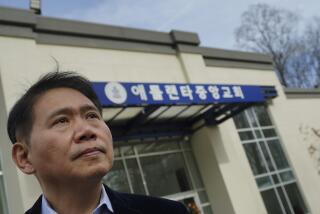Freed Koreans head from Kabul to controversy
- Share via
SEOUL — Nineteen newly freed South Korean hostages headed home Friday after a six-week kidnapping drama in Afghanistan that ended with a deal with Taliban insurgents that critics fear could spur more abductions.
The South Korean Christian volunteers, part of a group of 23 missionaries abducted in southeast Afghanistan in mid-July, arrived in Dubai, United Arab Emirates, on a chartered United Nations plane from the Afghan capital, Kabul, airport and security officials in Dubai said.
They are expected to spend the night in the emirate before leaving today for Seoul.
The Taliban killed two male hostages, and two women released earlier have already flown home. The insurgents, however, have vowed to abduct more foreigners.
South Korea’s relief over the hostages’ release gave way to anger at the victims. Critics said religious workers’ actions forced their government into negotiations with the Islamic militants that damaged the nation’s international reputation.
Some of the abductees apologized Friday for the trouble caused by their captivity, and a few collapsed when told the militants had slain two colleagues. One said she secretly kept a diary on the lining of her pants.
Public anger toward the hostages had been expressed in one form or another from the beginning, and it was rising Friday.
Scathing comments, written with the cloak of anonymity, flooded Internet message boards. Newspapers published critical editorials.
Most prominent was the assertion that the hostages and the church that sent them to Afghanistan were to blame because they did not heed repeated government warnings to stay away from the volatile Central Asian country. One advisory cited an intelligence report that insurgents were targeting Koreans.
“They were told not to go,” said Kim Young-soo, 42, a travel agency employee in Seoul. “They shouldn’t have gone there in the first place.”
As a result, critics argued, the government was forced to deal directly with the Taliban, in violation of the international principle of not negotiating with terrorists. Seoul is also alleged to have made a secret ransom payment to the insurgent group, although the government denied it.
“Speculation has been rife over a ransom payment. And we are concerned that other kidnapping incidents targeting our nationals might occur,” the newspaper Dong-A Ilbo said in an editorial.
Officials have hinted at the possibility of seeking compensation from the former hostages for expenses incurred by the government in winning their release -- at least airfare and medical fees -- a highly unusual proposition seen as reflecting public anger over the crisis.
As another condition for winning the hostages’ release, the government promised that it would stop Christian missionary activity in Afghanistan, and Korean media raised questions about what they called “rash” evangelical activity in a Muslim nation.
More to Read
Sign up for Essential California
The most important California stories and recommendations in your inbox every morning.
You may occasionally receive promotional content from the Los Angeles Times.













